Is it really that time of the year again already? I could swear we just had an Essen fair, and suddenly the jury is announcing Spiel des Jahres nominees. Time does fly when you’re having more new boardgame releases than anyone could ever play. But here it is, and so we’re going to do what I guess most of you want: tell you about the nominees!
This post is about the nominees and recommendation list for the Spiel des Jahres, separate posts for the other categories will come really very soon™.
The Nominees
Kingdomino (Pegasus Spiele)
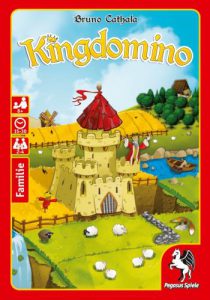
Bruno Cathala’s Kingdomino tells everything in the title: it uses Dominoes rules to build a kingdom. Every player works on their own kingdom, but they compete for the tiles. Those have, in classic Dominoes fashion, two squares, but there they show different landscapes. To place a tile in your Kingdom at least one square must match the square next to it. You also have to fit your entire kingdom in a five by five grid. What makes Kingdomino interesting is the connection between picking your tiles and player order. Out of four available tiles, every player marks the one they want. Then, in order of the tiles from top to bottom, they put that tile in their kingdom and place their marker on their tile of choice in the next line. Picking exactly the tile you need might strand you at the end of the player order, and thus without any real choice for the next round. A light and quick game, but that mechanism sounds fun.
Magic Maze (Sit Down!)
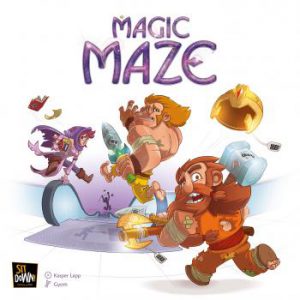
Magic Maze by Kasper Lapp and Sit Down! (German distribution: Pegasus Spiele) is a cooperative game with a tight time limit, but cooperation works in a way you probably haven’t seen before. To help a group of adventurers steal fresh equipment from a magical department store, the players don’t each control one of the adventurers, they each control one of the directions they may move. Every player may move any of the pawns on the board, but only in their assigned direction, and since all players play at the same time in Magic Maze, you can imagine the ensuing chaos.
El Dorado (Ravensburger)
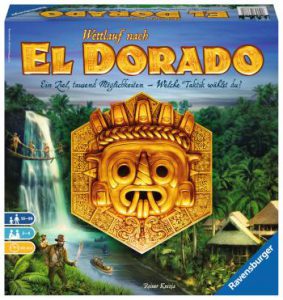
El Dorado (German title: Wettlauf nach El Dorado) by Reiner Knizia and Ravensburger mixes deck building into a racing game. The race is, as the title says, about getting to the legendary golden city of El Dorado, hidden deep in the jungles of the Americas. To move through the jungle you use cards from your hand, cards that must match the landscape you wish to enter. You start with some of those cards, but as you might imagine they are not the most efficient ones. That’s why you can forgo your slow moves and use your hand cards instead to buy better movement cards – or you buy special cards with all new options. This being a family game, you’re not looking at Dominion levels of deck building strategy, but you still have to make the right decisions about your deck to get anywhere.
Our Thoughts
Okay, so here’s the thing: I give up on predicting a winner for the Spiel des Jahres awards. Ever since I started trying, I don’t think I’ve been right once. So I just won’t try. All three games have a right to be in the selection, and I’m crossing my fingers for all of them. Yes, I know that doesn’t make sense because only one can win.
El Dorado would be a great pick because it’s the most complex of the three nominees. Magic Maze has the quirky new cooperation mechanism going for it. And Kingdomino, while it looks like the least complex of the three, has a great core mechanism in connecting tile selection with the player order. So I won’t choose.
But we are curious what you would pick! Leave a comment below, or head over to our Facebook page where I’ll try to set up one of those fancy voting gadgets, and let us know who is your favorite. We might pick someone who got it right and make them our oracle for next year. I’m not sure yet. I mean, it literally just occurred to me, but if you guess right we might make you our Spiel des Jahres oracle. If we have a budget we might have a t-shirt printed or something, I really have no idea. But you wouldn’t want to miss the potential chance, would you?
Recommendation List
Just like every year, the jury has also put together a list of games that are not in the running for the award, but that they nevertheless recommend you try. Here are this year’s entries.
DEJA-VU (Amigo)
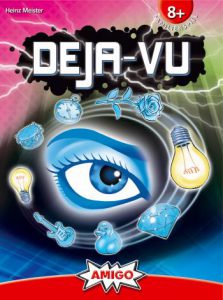
DEJA-VU (yes, all caps) by Heinz Meister and Amigo is an especially evil variety of a memory game. Picture cards are turned from the deck one after the other and players have to grab them as quickly as possible, but only if the second card with the same picture was already turned this round. If the second card was not turned yet and comes up later, then the player who grabbed the first is eliminated. To make things even harder, many objects on the cards intentionally look somewhat similar, and one game is played in three rounds, so you have to keep straight which card you saw in this round and which you remember from before.
Dodelido (Drei Magier)

Jacques Zeimet’s Dodelido is a game from the genre that must be called my nemesis: attention games. All a player has to do on their turn is turn over a card from their deck, place it on one of the three discard piles, and then immediately call out the characteristic that most visible cards share, either their animal species or their color. Unless none of the cards have any similarities, then the call is “nought, and unless two characteristics have the same count, then it’s “dodelido”. Paying attention and making the right call quickly is not for me, I learned that much from playing Cockroach Salad, but at least I will have fun failing. And if not me, then everyone who’s watching.
Fabelsaft (2F-Spiele)
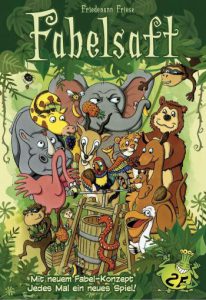
I’m glad to see that Fabled Fruit / Fabelsaft, Friedemann Friese’s response to Legacy style games, has made the list, just because we’ve been having a lot of fun with this one already. Just like a Legacy game, Fabled Fruit changes from game to game, but here you don’t destroy anything or draw on the game board, what changes is the display of available cards. The goal is to make juice with the right selection of fabled fruit, and a large selection of animal cards helps you with that. Whenever you buy one of those cards from the display, new card is turned over from the pile, and every so often that brings a new species into the game with a new card ability to try and use efficiently. There are more cards than you could possibly see in one game, or in five, or in ten, but after every game you save what is currently on display. The next time you play, you start with those cards, and keep adding new cards from the pile. You get a different game every time, with cards that become increasingly more complex, and when you’re done all the way you can sort the eternally growing discard pile and start over.
Klask (Game Factory)
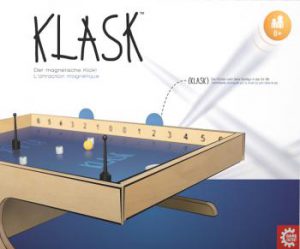
Klask by Mikkel Bertelsen and Game Factory (German distribution: Carletto) is a kind of dexterity sports game that is rarely seen in the Spiel des Jahres, a game that sits somewhere between tabletop football and Crokinole. Inside the wooden frame of the game area, the two players each control one bat to hit a ball about. Their control is indirect, though, by moving a magnet below the arena. The goal is a depression on the other side of the field. Batting the ball into the opponent’s goal is the obvious way of scoring, but there are two other ways that are more common for beginners. If your bat falls into your own goal because you haven’t been careful enough with the magnet, your opponent scores a point. Likewise, if you pick up two of the three magnets at the halfway line with your magnetic bat, your opponent scores a point. At some point around your third game you start scoring your own points instead of relying on your opponent to give them to you.
Shiftago (WiWa Spiele)
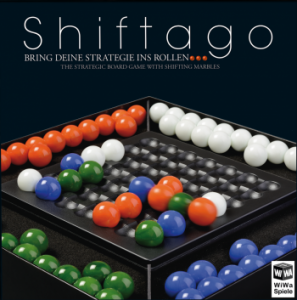
The abstract strategy game Shiftago (Frank Warneke, Robert Witter, WiWa Spiele) looks a little like a four player Abalone with its large, colorful marbles, but the game is a different one. All you have to do in Shiftago is form a line with five or more marbles of your color by rolling them onto the board from one of the sides. The only thing you can’t do is push another marble of the board. Creating a line would be easy, if your up to three opponents weren’t trying to do the same. I don’t believe in the duration of ca. one minute per game, but less than five sounds realistic, and you get a tactical game free of any sort of luck in that time.
Tempel des Schreckens (Schmidt Spiele)
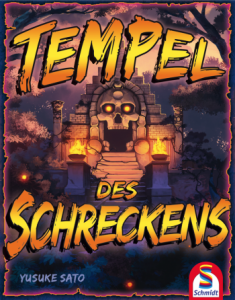
Tempel des Schreckens (no English title, but it re-implements Don’t Mess With Cthulhu) is a social deduction game by Yusuke Sato for up to ten players. A group of adventurers has entered the titular Temple of Terrors and want to make off with as much of the temple’s treasure as they can carry. But among them are some of the temple’s guardians in disguise, trying to lure the whole expedition into deadly traps. Each player has some treasure cards they may see, then shuffle and put on the table. They tell the other players what cards they have, or claim to have, and the current player decides who’s treasure chamber they would like to open. Unless a Guardian carelessly claimed to have five treasures finding a trap only means you had bad luck, you’ll only figure out who the real guards are through repeated incidents. Or maybe you just won’t figure it out.
Word Slam (Kosmos)

Word Slam is yet another new party word game, it’s another genre where I’m eternally surprised that someone can come up with new ideas. In this case, Inka and Markus Brand did. It’s the familiar concept of one person on the team knowing the secret word or phrase and all the others having to guess it. The only way to give hints in Word Slam is with the 105 word cards, showing words like “water” or “white”. That’s okay when you have to describe milk, but challenging when the secret word is lactose intolerance. Two teams try to guess the same word, and whoever gets it first wins the round.

